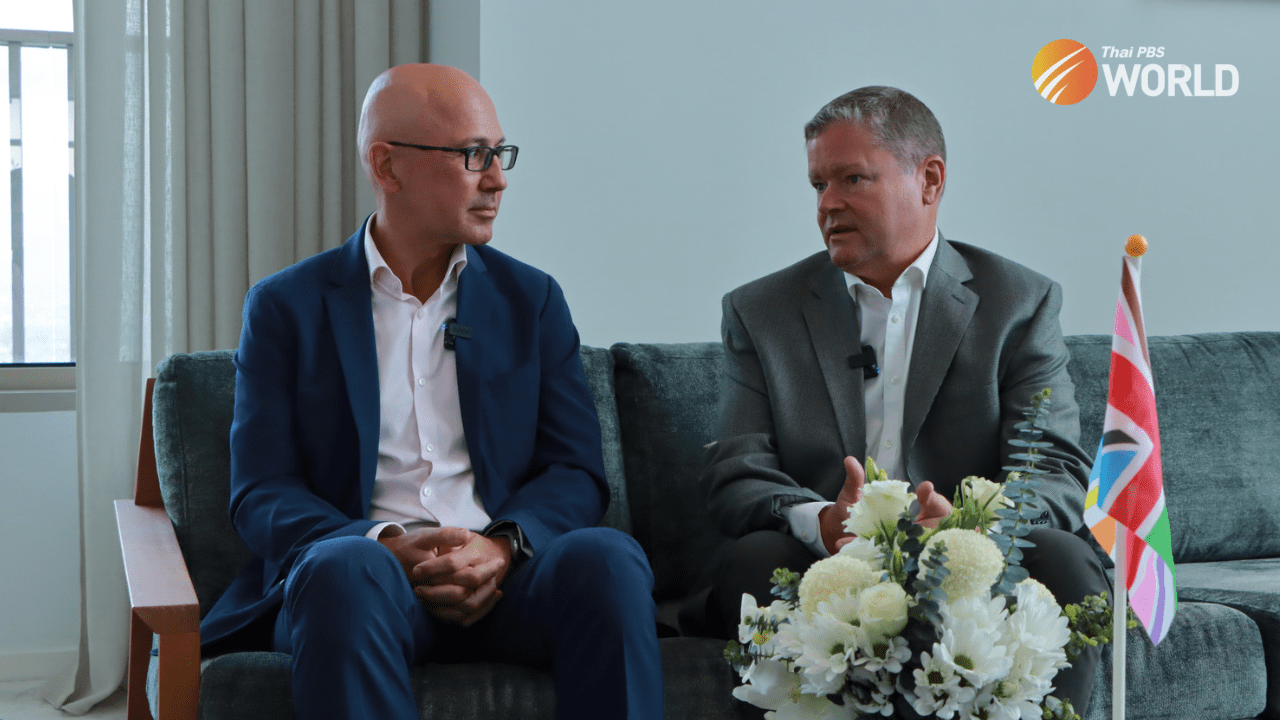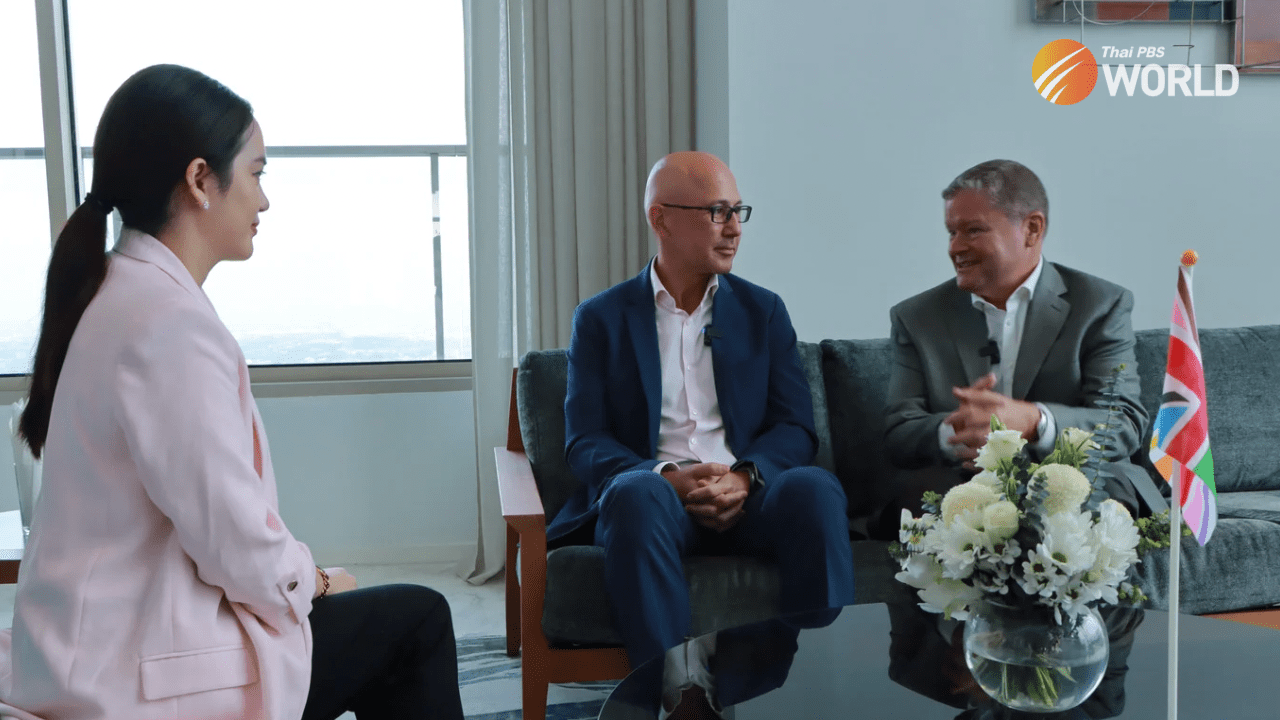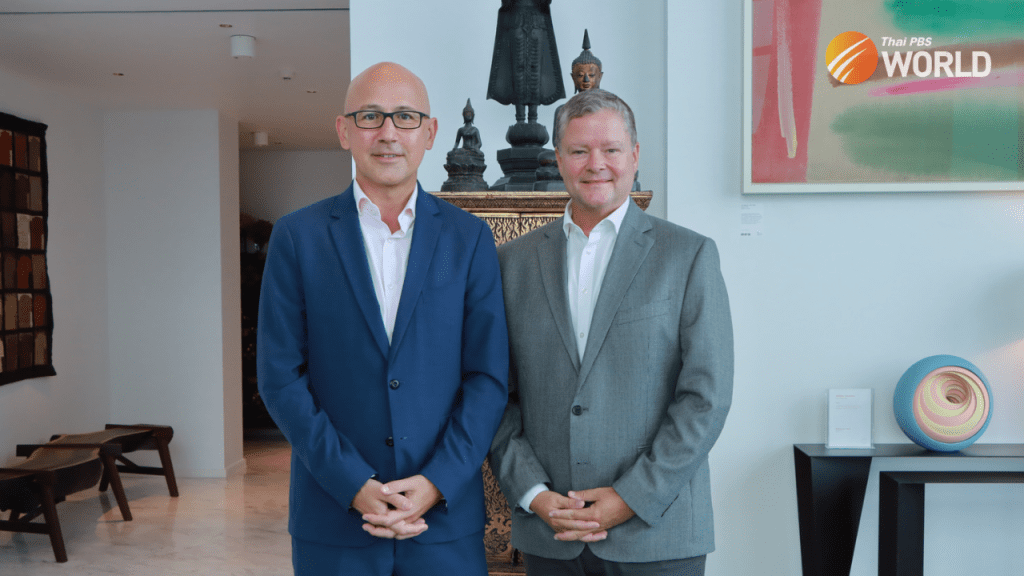As the Thai parliament approved the the marriage equality bill on March 27th, it coincided with the tenth anniversary of legalised same-sex marriage in the UK.
British Ambassador to Thailand, Mark Gooding, and his husband, Dr. Christopher McCormick, took this chance to reflect on the UK’s journey to achieving gender equality and LGBT+ rights, while also expressing hope for Thailand to become the first Southeast Asian country to legalize same-sex marriage.
“It is the 10th anniversary of the first same-sex weddings in the UK, but I think it also marks decades of progress in the UK on LGBTQ+ rights, including the decriminalisation of homosexuality in the 1960s, gay adoption, equalisation of the age of consent and the Civil Partnership Act, which took effect in 2005 in the UK,” Mark explains.
The same-sex marriage law in England and Wales was passed in July 2013, but took effect on March 13th, 2014. Consequently, the first same-sex weddings took place on March 29th, 2014. The same law in Scotland passed in February of the same year and took effect in December 2014. Northern Ireland was the last part of the UK to legalize same-sex marriage in July 2019, which took effect on January 13th, 2020.
In fact, Mark and Chris were among the very first couples in the UK to register a civil partnership.
While they have been posted to several countries before Thailand, including Sri Lanka, China and Cambodia, they say they have never experienced difficulties living as a gay couple outside of the UK. They have been warmly welcomed, especially in Thailand.
“I have to say that, here in Thailand, Chris and I have had a very positive experience,” Mark explains. “We’ve been coming to Thailand for many years, both for holidays and for work trips, and we’ve been welcomed strongly. So, we find Thailand to be a very inclusive and diverse society.”
“I think the fact that we have been so warmly welcomedreally speaks very highly to the inclusive nature of Thai society,” said Chris. “It has been a very positive experience for us being here, but also, in other postings, we’ve been warmly received and we got to know people of all different cultures and identities. It’s been a chance for us to grow and learn about how people express their identities in different parts of the world and that’s a really good education for us as well.”
Ever since the UK legalizedd same-sex marriage, one significant change he noticed was the perception of equal marriage, before and after the legislation. Citing poll results, he said that in 2010 and 2011, before same-sex marriage was legal, only 40% of the British people supported equal marriage, but since the law was enacted, the number had doubled to 80% by 2023, indicating that British people have generally embraced the change.
“Social views have actually moved very, very quickly and you see the same happening in many countries,” said Mark. “I think that’s a good thing. It can make the UK more inclusive, more diverse and have a happier society.”

-Social problems-
Despite legislation to protect LGBT rights in the UK, such as an equality act that prohibits all forms of discrimination, the British Ambassador to Thailand noted that many difficulties still exist. The main issues include bullying, prejudice, violence based on gender, and access to healthcare for LGBT individuals.
“Even if you’ve got the best legislation in the world, you can still have discrimination,” he believes, saying that the current difficulty is increasing awareness across all sectors.
“There are challenges in terms of raising awareness among people, businesses and employers about the importance of inclusion and diversity, but there are plenty of studies around the world showing that, if people feel they’re able to be themselves in society and at work, they will become more effective, they will be happier and there will be more innovation and creativity. So, I think it’s a big plus for society to protect and promote LGBT+ rights, as well as diversity and inclusion in all its forms.”
Besides raising awareness, what the Ambassador believes is much more important is taking action to address gender discrimination and other challenges facing the LGBT community, which he believes is the way forward to achieving gender equality.
As for Thailand, although the country is perceived to be an inclusive and diverse society, the British Ambassador thinks that a lot of work still needs to be done, to ensure fundamental rights for the LGBT community, whether it’s through legislation or the education system. He also believes that society should provide a safe space in which these people canraise their concerns.
“I think what’s important is that you have space for LGBT people and groups in which to share their experiences and concerns, so that you can actually understand where the challenges lie. Once you have that knowledge, you can actually try to act and address those challenges.”
At the same time, the British Ambassador also feels that gender representation in decision-making positions plays a significant role in ensuring inclusivity and diversity, especially in policymaking.
As he pointed out, the UK has a higher proportion of LGBT and female MPs in parliament, unlike Thailand, which has a very low percentage. In contrast, there are no CEOs in “top” companies in the UK who identify themselves as LGBT, including a scarcity of female CEOs, while Thailand enjoys a very high percentage of female CEOs in the business sector.
“So, we still have challenges as well, but I think, if people see ambassadors, politicians or film stars, [the LGBT people] can see them as a role model and they can become more confident in themselves that they can also occupy these jobs in the future,” he said.
As a strong supporter of LGBT rights, he also said that the UK government has been active in promoting gender equality and diversity in many countries around the world.
“We’ve got new funding, announced last year, for global action to tackle violence against LGBT+ communities, to tackle discrimination, to improve access to healthcare. So, we’re active everywhere and we want to work with the government here in Thailand as well as civil society groups to protect LGBTQ+ rights.”

-Hopes for Thailand-
Despite the underlying social challenges, the British Ambassador is optimistic that the Thai government, led by Prime Minister Srettha Thavisin, can successfully push for marriage equality in the very near future. He also feels the current leader of Thailand has strongly expressed his personal support for marriage equality.
He said, “I’m very positive indeed. Thailand is known for being a very inclusive and diverse society and I think the important thing is for the UK and Thailand to be honest about the challenges they face., where they are present, and be are open to addressing them. I find that the people I talk to in Thailand about gender diversity, about LGBT+ rights, are very enthusiastic about this agenda.
Meanwhile, his husband, Chris, also sees a positive future for Thailand. “I think the future is very bright. I think thereare a lot of great opportunities and it’s nice to recognize what needs to happen across different sectors, as Mark has been mentioning, and knowing the challenges people face… and trying to bring it together with legislation.
Apart from legalising marriage equality, Thailand has another aim, which is the bidding to host World Pride in 2028. This, the Ambassador thinks, would enhance the positive reputation of Thailand, especially among foreigners, indicating that the country welcomes gender diversity and that the LGBT rights are fully protected.
“If you’re a tourist coming from Europe, you’re LGBT+ and you want to come to Southeast Asia on your honeymoon or your holiday, which country are you going to pick? If people know Thailand is an inclusive and diverse society, which protects LGBT+ rights through equal marriage and non-discrimination legislation, I think you would probably choose Thailand. So, I think it sends a very positive signal globally about Thailand,” said the Ambassador.
By Nad Bunnag, Thai PBS World





